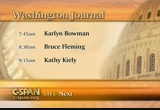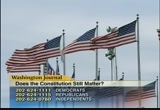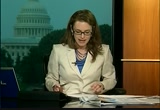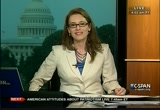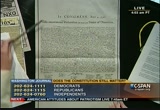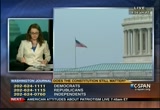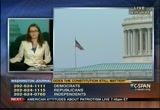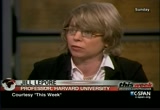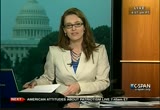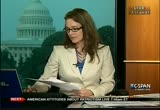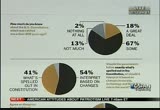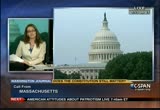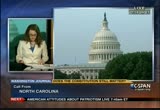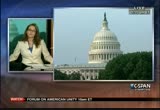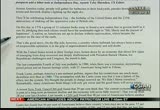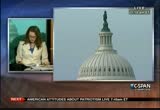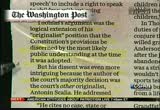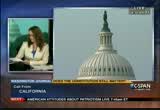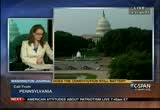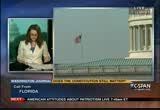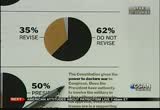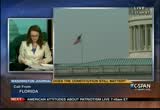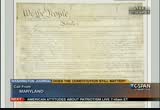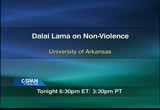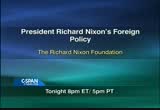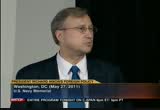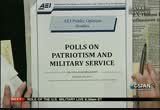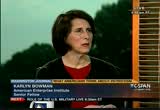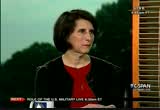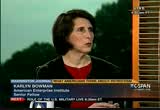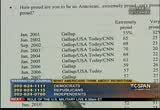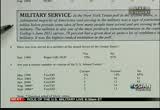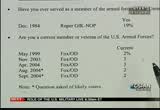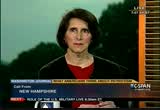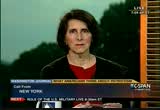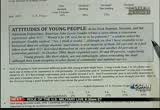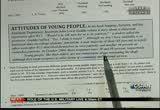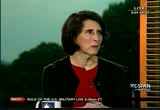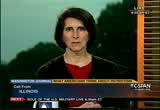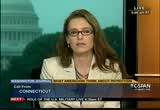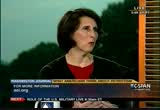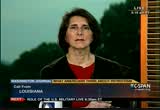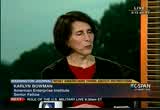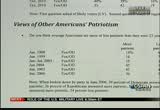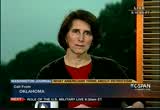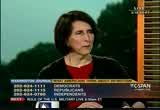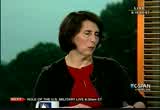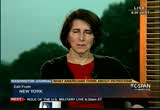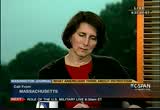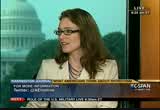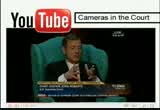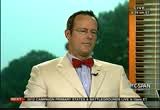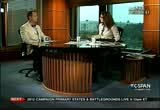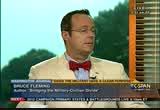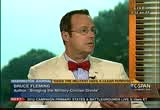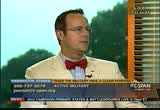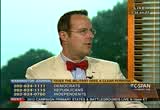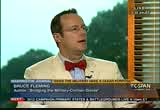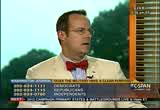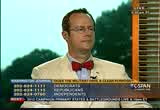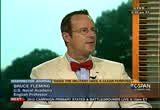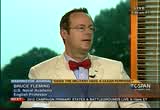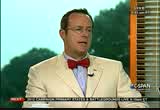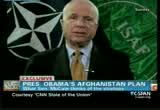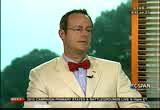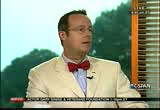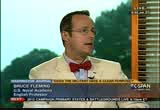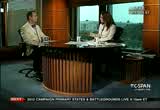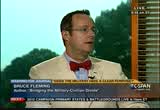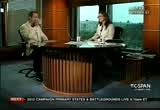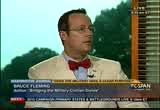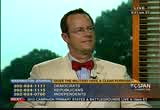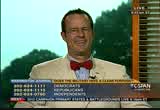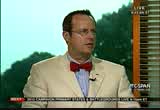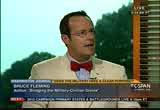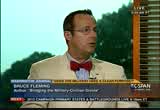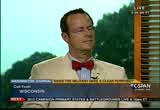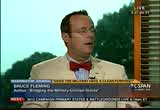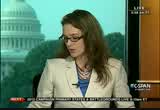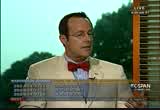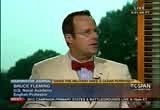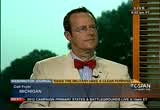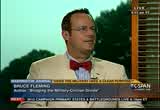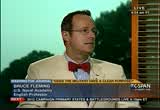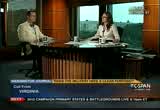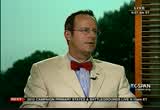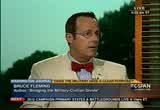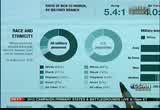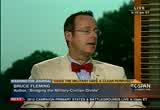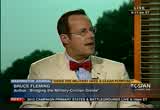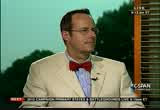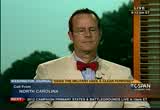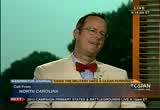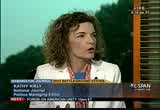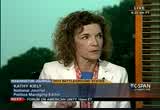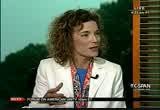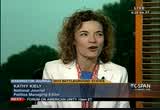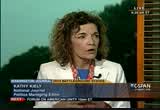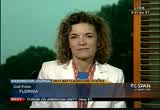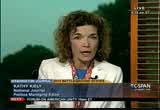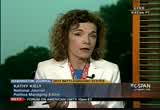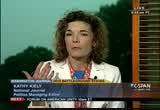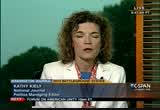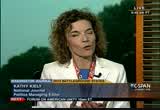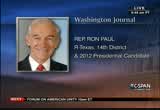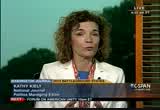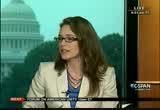tv Washington Journal CSPAN July 4, 2011 7:00am-10:00am EDT
7:00 am
science monitor article. and kathy kiely, politics manager, strategies for the gop candidates and president obama in the 2012 campaign. "washington journal" is next. >> good morning on this independence day, july 4, 2011. welcome. in 1776 the continental congress adopted the declaration of independence on this day, coloniesng that the 13 colora or independent states. today, whether the constitution still matters is the question. the numbers to call are on your screen.
7:01 am
you can also e-mail us. and we are on twitter. we will be able to read that on the air. let's take a look at a recent cover. the constitution, does it still matter? this was on june 23, looking at how well and the constitution still lists today. he writes that americans have debated the constitution since the day it was signed -- so that is our question to you
7:02 am
on this independence day. going deeper into the article, it's as a new focus of the constitution is at the center of our political stage with the rise of the tea party and it's almost fanatical focus on the founding documents, it says. in the republican congress organizer reading on the house floor to open its first session. as a counterpoint to the rise of constitutional originalislts, liberal legal scholars analyzed the text just as closely to find elasticity they believe the founders intended. how relevant do you think the constitution is today? let's go to philadelphia, pennsylvania, leonard, a democratic caller, good morning. are you with us? caller: yes.
7:03 am
i keep the constitution is very important. -- i think the constitution is very important. it means everything to bthe law. i feel passionate about the right to bear arms. i like to carry guns. in ohio.'s go to jose caller: i am racist, i have no religion, adolf hitler was correct. host: apparently liked the freedom of speech. we will go on to other callers. does the constitution still matter is the question. is there an amendment you find particularly relevant? there is the declaration printed on the back of the paper.
7:04 am
the unanimous declaration of the 13 united states of america printed on the back of the new york times. and the two most important and enduring document in our nation's history. it's been said the declaration of independence was a promise and the constitution was the fulfillment. let's go to pennsylvania. james on the democrat line. good morning. caller: good morning. i just wanted to say that i believe the constitution most certainly matters even more so today, because i believe that that's the trouble with the country, it has got away from what the constitution was written for, in my opinion. they need to get back to the basics of the constitution and
7:05 am
we would not have so much bickering between the two houses. host: let's go to georgia, richard joining us on our independent line. good morning. caller: good morning, libby. thanks to c-span for taking my call. it matters. it's the basic foundation of our government. if we get away from the constitution, then who makes the law? we would lose our stability. we have the three branches. the supreme court would rule depended on who would be the majority. it would change constantly. the opportunity and that we have had over the last 230 years would disappear without
7:06 am
the constitution. about let's go to comment the constitution. >> they are framing this debate around the constitution that this is under siege. >> it has been for centuries. woodrow wilson and probably the rest of the progressives set out to say that the constitution was all very well once, but now we are more complicated society with more grand ambitions. the founders put the government on a short leash and the progressives say that we need to cut that leash. >> therein lies the he origins of this impasse we are in now. the sense of crisis is grossly exaggerated in this world in which we are going to hear more about crisis.
7:07 am
made's a set of arguments that the document needs to be worshipped in the way you might worship and other documents. i think it can be traced to the founders. the constitution should never be looked at as covenant too sacred to be touched. >> that was on abc. a question for you this morning: does the constitution still matter? there was a recent story looking at the constitution in "time" magazine and what americans think about it and how well and how they feel it is today. we want to hear from you. glycerides the following on twitter ---- melissa writes.
7:08 am
now to bob, a republican. caller: does "time" magazine really have any relevance? when you have a radical leftist there, you should have somebody on the other side was in favor of the constitution. "time" magazine cares little about the constitution. host: why don't we read some more about this piece so you can see more about what the writer is talking about. we in will show comments from other newspapers looking at freedom and the constitution and origins of the country. in this piece he asked about things unlike the debt ceiling and the war powers act and the president's push for health-care and whether these things are constitutional. there is the section on obamacare. oakwood congress shall have the
7:09 am
7:10 am
going this way and that way and saying that the constitution matters so much and that we cannot do that because the constitution does not matter. we need to sit down or they need to sit down and really look at should be doing now. i don't think we are doing anything that we should be doing to adhere to the constitution. host: let's look and a comment on twitter. edith, independent in lafayette, louisiana. caller: good morning. i had to call this morning because i had been so disturbed lately regarding issues of the constitution, because it appears to be now that the way congress is behaving that they are
7:11 am
breaking the very first and primary tenets of the constitution, which is "we the people." " t is notorporation -- is no we the corporation or we the oligarchy. the congress has been representing a very small percentage of the population, whereas the rest of the people, their needs and wishes are not being fulfilled. that master change. change.pastor changhas to i'm concerned about this country becoming a police state. host: daniel on the line. caller: have before the july. the constitution still matters extremely. the definition of what we are as
7:12 am
americans and it defines us as a country. without the constitution, we are nothing. it sends us on our course and has been for 200 years and will continue for long time. we should look at it a little harder than we have recently and go back to the basics of the constitution. in the country would come back together. >host: do you think in the constitution has been discussed more or less? caller: as far as policy, we still have a long way to go. but i think it has been discussed more. things will continue like this for a long time to come because we are ever-changing. host: how much do you know about the u.s. constitution? 67% of americans polled said they know something about it, 80% said a great deal. not much, said 13%.
7:13 am
2% said they know nothing at all about the constitution. should the government follow exactly what is spelled out in the constitution or should interpret it based on changes in society, technology, and the u.s. role in the world? 54% said too interpret it based on changes. 41% said what spelled out in the constitution. here's another one. state and local governments are not allowed to ban handguns and concealed weapons even in high crime areas. 60% agree to that. 38% disagree. betty is joining us from massachusetts on the democrat line. good morning. caller: >> absolutely, the constitution still matters. the electoral college provision in the constitution should be deleted.
7:14 am
it's not relevant anymore. 200 years ago when it was written it made sense. now with instant communication it does not matter any more. it does matter, but it should be one person, one vote. and i just have believed that for a long time. host: thank you. let's go to north carolina. grayson is an independent scholar. caller: happy for the july. >> how host: how relevant is the constitution and what you think about your role in america? caller: the constitution certainly matters today. the reason why, the things in the constitution are what americans believe in. it's what we take pride in. those liberties, laws, freedoms.
7:15 am
our constitution is so different from other countries' constitutions. if we look internationally, the political strife in countries in africa and south america, because their constitutions are different or, excuse me, not different, but different compared to the american constitution. it has a lot of -- brazil has a long constitution and it has been a source of many political strifes in that country and other countries. a lot of other countries to admire the american constitution. i think it matters as much today more than ever even though there have been changes in our society. it most certainly matters. i think all americans should
7:16 am
it. it and take pride expin host: when was the last time you read the constitution? caller: 2006. i bought an american government textbook and i read through the whole constitution. that was probably the last time, to be honest. host: thanks for your call. let's see what bill says on twitter. let's look at a piece written in "the telegraph." his take on the fourth of july, on how things will move in the country. he talks about how people are gathering for barbecues in their backyards and parades and fireworks displays and he talks about the history of the formation of the government as a nation. h
7:17 am
what you think about the state of affairs today and how the constitution is still relevant or not? let's go to the toledo, ohio. rick, a republican. caller: i don't think the constitution matters at all anymore. people in the private sector trample on a day in and day out, shipping and jobs abroad. and you have republican and democratic politicians that ignore it. on the congress is supposed to be able to declare war. a president can not commit
7:18 am
troops, not according to the constitution. lyndon johnson, kennedy's sending troops to vietnam under the advice of military advisers. presidents ever since kennedy have been acting like hitler, they can commit troops wherever they want to end to hell with everybody. host: this is the issue of the declaration of war powers in this article. it's s "the congress shall have the power to declare war ." richard stengel says that may 20 mark the 60th day since president obama lost military action in libya. the speaker of the house says the president is in violation of the war powers resolution, passed in 1973, that requires the president to withdraw u.s.
7:19 am
forces from armed hostilities if congress has not given its approval in 60 days. the administration argues that what we are doing in libya does not meet the threshold of hostilities in the legislation, so the resolution does not apply. kansas city, kansas, ronnie on our independent line. caller: good morning. host: is the constitution still relevant? caller: why really don't think so. if you go back to the time when it was written, it did not really matter to everyone who was in america. it did not matter to the black man because of the things that were written did not pertain to a black person. i guess it depends on what point of view you are coming from. i really think it is irrelevant right now. host: do you think the amendments and changed how will the constitution is, the changes over the last 200 years? caller: yes, it has made it
7:20 am
better and it has a much longer way to go. these politicians are just looking for their own constituents and themselves. it has a long way to go, i believe. host: albany, new york, ken, democratic collar. -- caller. caller: i believe july 4 is the holiday to celebrate, not the constitution. this country was created by freemasons not to be a christian country but to be a country that separated religion and the state. some people out there running for office who might want to run
7:21 am
a christian counseling center and take medicaid the christian counseling, which is not separation of church and state. in the preamble to the constitution, one of the things it mentions is to promote the general welfare. if we are talking about promoting the general welfare, that sounds like a vague kind of justification for the social programs. host: let's listen to the preamble -- pennsylvania, john, republican. go-ahead. caller: the constitution does
7:22 am
matter, but the amendments are just as important. when he talks about the changes after wilson, we have to remember that it was after wilson, the 19th amendment, i believe, that gave women the right to vote. that just annoys the conservatives that women were given the right to vote. all these changes -- the original constitution did not allow slavery -- you had to be a landowner before you could vote even as a white man. the changes are just as important as the constitution. host: i think we lost him. now to john, an independent in tampa, florida. caller: thanks for taking my call. happy fourth of july. i think the constitution is extremely important.
7:23 am
it not only gives us the guidelines for the laws of our country, but provides values and principles in the bill of rights. the founders were extremely wise in setting up the amendments procedure. rather than all the interpretations that are being done by the courts today. but if there are significant issues or additions, or things that need to be modified, the amendments system is the best means of doing it. it needs to be used as frequently as needed. thank you. host: someone is responding to our last caller, the republican, john. now, gregg, a democratic call in new haven, conn. does the constitution matter? caller: actually, my name is chris.
7:24 am
it's independence day, not just the fourth of july. the constitution was not ratified until 1787. there were treated during years of terror try to make it to go into force. the constitution is important. as so many callers have pointed out, the amendment practice is important. we wrote the constitution for 13 little colorado is on the east coast. now we are an empire. we have property in the pacific. we are totally different nation that when we started. thank goodness that they thought to " in the amendment process. starting with the present, they knew right away that the thing needed to be amended. thanks and have a good day. host: chris was talking about the history of the constitution. it was adopted in 1787 on september 17. a constitutional convention in
7:25 am
the philadelphia, pennsylvania adopted that and it was ratified in each u.s. state. it's been amended 27 times and the first 10 are known as the bill of rights. that's from wikipedia. now to west palm beach, florida, republican. caller: happy fourth of july. my take on this is the constitution is a very important document. as the previous caller said, it's designed to be a malleable document that has not evolved with our society. gratifications that have occurred have occurred such a long time ago -- the ratifications that have occurred occurred such a long time ago that it's not kept up with the people. it's been adulterated to the point where it has adopted its
7:26 am
own rules, but under the guise of a constitution. for me that does not work. look at the state of affairs we are in. host: how should be interpreted? caller: well, i am not in government, but my opinion is that the interpretation of the document as opposed to the los aaws and to the elected officials, it's our way to help our officials interpret that. it's not a loaded question, it is just a question i was not prepared for. i would prefer for government to have we did not have the ability to continue to adulterate the bill of rights, the constitution, etc. host: let's look at the concept
7:27 am
7:28 am
7:29 am
let's go to an independent scholar in flint, michigan. good morning, leonard. caller: happy holiday. i don't pentecost titian matters anymore. the don't think constitution matters anymore. no matter what, they changed their minds. we are supposed to have the right to own land. that's all i have to say. host: juan writes the following on twitter -- but look at a story today about votes happening in the house or
7:30 am
7:31 am
i think it needs to be written to say that "we the rich people get what we want and we don't want to help other people." it's unconstitutional and that they take jobs out of the country and it's unconstitutional that they get cheaper labor out of the country and then we have no jobs and they bring the products back here for us to buy and we are jobless. it's unconstitutional not to help your own people, like the bible stated. yet the republicans always talk about christianity. christians in the bible were taught to help their neighbors. host: geraldine, republican caller in pennsylvania. caller: good morning. i want to remind everybody that the constitution was written to restrain the government, not the people. it goes to the separation of church and state.
7:32 am
that was set up so there would be no state religion. it does not hamper religion in any way. whether we want to practice on a street corner or anywhere we want to. i am so tired of people misinterpreting what it was all originally about and it certainly does matter and it will matter as long as we have a country. host: bob wright's from venice, florida -- what'd you think, tom, in miami? caller: thanks for taking my call. i've been watching 30 years and i appreciated getting in. the question is does it matter or whether it should matter? it should matter.
7:33 am
whether it does is debatable. it's all about we the people. seems like conservatives don't even read the constitution or the dictionary or history. they talk about original intent. the original intent was we the people. there's nothing about the business, profit, corporations. it's all about the people. preamble mentions people, the general welfare. the original intent with the founding fathers was for we the people. as far as it not being changed, article 5 spelled out exactly how to change the constitution. it is 9 concrete. we are supposed to change it and we have changed it. we are just deviating from its. it's no longer about we the people. it's about the corporations.
7:34 am
i have a cousin was signed the declaration. my relatives fought for the union. they fought for we the people. host: let's look at article 5, which you mentioned. in ohio, marlene is calling us line. democrat'ss' caller: the constitution still matters because of the rights we have and our belief system. host: what do those mean to you?
7:35 am
caller: it means to me that this is a belief system that has worked for 200 years. host: do you think the constitution should be interpreted exactly as it was written or said there be room for a modern interpretation? caller: there should be room for some interpretation because life does change and we don't have the same life we did 200 years ago. we have a different technology and a different educational system and it has to have some changes. host: let's look at these polls. the 14th amendment says that any person born in the u.s. automatically becomes a u.s. citizen.
7:36 am
let's go to a republican in queens, new york. caller: in 1945, nicole kidmho h said we hold these rights to be self evident. do thousand years before that, jesus christ came. if there had been a first amendment in drizzle, he would not been crucified. there was john locke with the indictments, continue with the jefferson, bare truth is
7:37 am
international. these troops will remain for -- these truths will remain for thousands of years. we need to understand what it means, inalienable rights. guest:, and no beach, florida, welcome. pompano beach. caller: i believe it matters. i believe the people who put the constitution together were wise enough and understanding enough to create a living document. had they not, it would not be relevant now. the only reason it's relevant now is because it does change with the times. if it did not change with the times, it is extremely unlikely he would have the job that you have. my ancestors were slaves. i would not have a opportunity
7:38 am
to talk to you because i would be less than a person. it evolves and grows and people who try to keep this from happening harm all of us. go to one of our e-mails, minnesota. temple hills, maryland, ruth on the democratic line. caller: good morning and happy independence day. yes, the constitution definitely
7:39 am
matters. it matters because it is amendable. it is a living document. that is the only thing that makes it relevant today. but the problem is the politicization of our courts and their interpretation. example, a corporation is a person. that is dastardly. money is free speech. these are the kinds of things that are killing our communities and our society. it's because the courts are so politicized today. that is the problem. the fact that is amendable, it's a living document, that is what makes it relevant. thank you very much. host: west virginia, sarah is a republican collar. caller: hello. the constitution is very relevant today. when we swear in people to offices in the government, they swear to defend and uphold the
7:40 am
constitution, not to tear it down. i believe we need to get back to that can and people need to know what the constitution says before they take government office where they are expected to defend the constitution. in many cases it turns out they want to tear it down. that's all i have to say. host: let's look at one of the stores in the news, what's going on nationally and internationally. we will be talking more on the
7:41 am
7:42 am
constitution still relevant? now to the democratic line with lawrence from new jersey. welcome. caller: thanks for taking my call. >> is the constitution still relevant? i don't think it does. most americans don't know anything about the treaty of kent. it says to return things to the way they were before. we established the federal government, the irs, and federal income-tax. anniversary ofe 2 the signing of this treaty. rights will be taken away.
7:43 am
7:44 am
7:45 am
lama and vincent harding talk about non-violence. they spoke with more than 10,000 people at the university of arkansas discussing osama bin laden's death. as well as the nuremberg trials and execution of sadaam hussein, and the death penalty. >> in the 20th century the number of people killed through violence, over 200 million. there has been exploitation [unintelligible] these things i fear. >> what the discussion this evening at 6:30 p.m. eastern on c-span.
7:46 am
tonight on c-span, a look back at president nixon's farm policy. members of his administration and the president's son-in-law discuss topics including communism in china, invading north vietnam, and the 1967 war in the middle east. >> the discussion then in the newspapers was nixon's secret plan for peace, what was it? it was rockefeller pushing nixon to say something to expose what his plan was. rockefeller did not think nixon had a plan. i was in the library waiting for patricia to change your clothes because we were going out and it came in after a hard day of campaigning -- he came in after a hard day of campaigning. i asked him what his plan was. he said it is going to go to the
7:47 am
moscow and beijing and bring peace back to the world. >> what the discussion tonight it's 8:00 p.m. eastern on c- span. >> mission control, houston. >> roger, discovery. >> nasa is on schedule for the final mission of the space shuttle program this friday with the launch of 135 atlantis. a look back at the shuttle program starting with columbia 30 years ago and explore what is ahead for nasa, online at the c- span video library. search, watch, click, and a share, any time. >> ""washington journal" continues. >> we want to talk about aei's article that you worked on.
7:48 am
how often does the topic of up intism come polling? guest: not very often. host: how does the interviewer again at the question? guest: this simply ask straightforward questions. host: here is one pulled from cbs news. -- here is one poll. how does the phrasing of a question like that affect the outcome? guest: that's always important in polls. they give people a range of responses they can choose. for that many people who say they are extremely proud to be
7:49 am
americans is a very impressive results. host: and different wording -- how patriotic are you? 32% said extremely patriotic. guest: i'm always impressed by those responses. small number of americans say that they're not patriotic. host: 78% in 2008 said that voting was something they consider to be patriotic. 70% said saying the pledge of allegiance was patriotic. guest: americans define it very broadly. military service comes up at the top expression of patriotism in most polls. all these other things, volunteering, voting, are expressions of patriotism.
7:50 am
host: as you look at these polls, what sort of trends emerged? what did it suggest about how americans feel about patriotism? guest: i'm interested in patriotism and very broadly defined. the attitudes about patriotism show remarkable stability and continuity over a very long period of time. after 9/11 we saw a spike in patriotic attitude. that is not surprising. there were more displays of patriotism. people flew the flag more often and put stickers on their cars. for the most part, these attitudes have been remarkably stable since pollsters first started asking the question. >host: what is the purpose of looking at so many polls? guest: we don't conduct any surveys of our own.
7:51 am
we look at surveys in the public domain. the various sources. we compare the results of a lot of different topic. i have done public opinion studies on various topics. we are preparing according to see how the results -- we are comparing the wording to see how the results change because of that. host: karlyn bowman strutted evolution of american politics, things of changed over time. if you want to join the conversation, call us on the appropriate phone line. let's go to james on our independent line calling from pittsburgh, pennsylvania. at the we will have him in a moment. in the meantime, you spoke about how things changed after
7:52 am
september 11 over displays. how associated are the actions americans have, how much do they perceive that with their feelings of patriotism? are there patriotic people that don't display it in large numbers? guest: absolutely. i think most people are patriotic and heart. some people are less willing to wear it on their sleeve. host: how have things changed under this administration to the obama administration? guest: it's not changed. host: paillettes look at this. this.'s look at how proud are used to be an american? -- are you to be an american?
7:53 am
not a big change when president obama came to office. what does that say to you? guest: remarkable continuity about something that is very important in defining this as a people. it does not seem to matter whether we have a democratic or republican president. we are patriotic nonetheless. host: james, pittsburg, republican line. caller: my comment is that you have to poll the younger crowd and they are the strongest and the fastest and most easily -- and it is easier for them to take in all the information they have take in. they are more alterable to
7:54 am
become a soldier and not many of them are politically savvy. once they get into the war, they are generally -- most of the men i know that have come back especially from this war and from vietnam, they speak to the fact that they were fighting for its other. host: we will leave it there. guest: that is true. men who have had that experience in war talk about it that way. they also love their country. one of the things we see, it's a hard thing to take polls of soldiers because it's tough to do. but when you do, they are very proud. you may be right, that's what they are thinking about when they are actually in the field is protecting each other. host: this piece says --
7:55 am
don guest: it's quite amazing. the military has been the top- ranked institution in that poll for quite a while now. an institution like congress comes at the bottom of the rankings overall. only 20% in the latest gallup poll had high confidence in congress over all. the military's mission is clearly and narrowly defined. the military protect the country, defends the country, phytosaurs, and -- fights the wars, and they do that job very well. host: 2% to 3% of likely voters
7:56 am
are members of the armed services. guest: that is a small swatch of the population actively serving. host: let's go to a republican caller, rosemary, in michigan. caller: religion is left out too much in the world today. the united states is not a world country. we are the united states of america. as to all the things that you see on youtube about the people in the military who pray, that is never shown on national television. i believe god is parts of the united states of america and that we have left too much out of the normal media. that's about all i can say. thank you. guest: you are right that america is a deeply religious country. that is something data has shown a long time from the polls.
7:57 am
\ in the 1930's when asked how often people attended church, four out of 10 americans said they attended. you are correct to say this is something that defines us as a people and the the is part of who we are. host: ray, democratic caller in new hampshire. caller: i live in the lakeport section. lake.n the host: go ahead with your question or comment and good morning. caller: happy fourth of july, everyone. i want to make a comment. having called over the years 11 of our local conservative programs, i noticed too much is tied to the military or
7:58 am
religious faith. anybody who speak their mind -- and the people who protest have just as much patriotism as anyone else. i have a problem when you say that patriotism means belonging to a particular religious faith or belonging to the military. patriotism is believing or loving your country. and if you see wrongdoing, you .tand up against asthat that is my comment. i really hate astigmatism -- stigmatism when people look at you if you are not pro-military or pro-god. guest: americans do believe
7:59 am
dissent is an expression of patriotism according to the polls. that is something i think all of us appreciate, but we live in a free country and we are able to criticize our government. when people are asked about the broad definition of a paper tourism -- a patriotism, being able to criticize your government is not considered unpatriotic. host: this comment says the pledge is nationalism and it's not patriotism. what is the difference? guest: patriotism is an expression of feeling, an expression of love of country. nationalism is something different. it's more an attitude about the nation overall. host: ed on our independent line from new york city. caller: good morning. being able to criticize your government as being patriotic and talking about the constitution.
8:00 am
i wished that the poll also included did we know today who we declared our independence from or if they really knew something about the constitution? words like treason have been thrown out for people wwe have d "treason." where people who criticize it are considered to be traders -- traitors. guest: one of the pollsters did ask knowledge questions about how much they knew about the declaration. we are often challenged, i guess i could say, in terms of our and levels of knowledge. one of the great voices in survey research from the public agenda foundation once said we live in a very highly functioning democracy but with a
8:01 am
very poorly informed public. certainly the questions asked of this week show americans are not -- some of the basic facts of our history. that is a problem for the society going forward. it is interesting that the pollsters to ask those kinds of questions. host: looking at the public -- aei's pull on patriotism and military service. we have a senior fellow from the american enterprise institute. she works on compiling and analyzing public pinning using public data on things like economy, taxes, the state of workers, environment, other issues. let's talk about young people. one caller mentioning the younger generation. here is what the project said. attitudes of young people in his work "pride, experience, -- security, and american experience." a classroom experience after 9/11 --
8:02 am
what does that story mean to you. it is interesting that his students did not feel that they could say they were paid to roddick before 9/11 -- host: it was not cool? older generation? guest: both could be true. that it was not cool or that the older generations were patriots and younger were hit -- hip. that is dating me for using the word. it becomes more meaningful to you as you get older. but still, young people start out being pretty patriotic, as the poll shows. 2004, october -- 39% who considered themselves to be very
8:03 am
patriotic and 49% somewhat patriotic. guest: those are high numbers. if you add them together. caller: i was wondering if your guest would comment on the study released on friday by harvard that indicated that young people who attended more patriotic events or parades would tend to be republican voters in their adult life, and if so, why that would be. thank you, and i would take my answer of line. guest: i have not read the full study. i just saw one quick news headline about it, so i don't think that the comment much on it. but often what you learned in childhood tend to be an anchor for you as you age -- whether it makes you republican of democrat, i don't know. but those early memories do tend to play a role as we age. host: the harvard kennedy school -- not every job in america has an opportunity to attend fourth
8:04 am
of july celebrations but those that do tend to be more politically engaged and associated more closely with the republican party. two conclusions in a new research paper by harford kennedy school assistant professor -- two assistant professors. let's take a look a digging it in -- digging into it. the me flip the page. one fourth of july before 18 increases the likelihood of identifying as republican by two% and voting for a republican candidate by 4%. surprised to find it would have such persistent defect. important job of events can have a permanent impact on political beliefs and behavior and for the july celebrations of the u.s. affect the nation that a political landscape. guest: again, i haven't read the study carefully, but i am not
8:05 am
surprised. early experiences have an effect. i am surprised by the political nature. a lot of add this to groups in washington working with young people in particular want to get them very active in terms of a voting and civic responsibilities at an hourly agent. but the political implications, again, i have not read the study. host: as someone who understands these polls, when you talk about likelihood of identifying republican at 2% -- guest: i would have to look more closely. given the methodology they use. host: james, democratic caller. good morning. caller: i just wanted to say that i think patriotism has been lost more among politicians than anywhere else and i think it has been -- has a bigger impact on the country got to behavior around patriotism and understanding it. politicians -- democrat and republican, has been more so
8:06 am
campaign words and using it -- putting political power before their country in their actions. for example, during wartime, after 9/11 during wartime, continuous -- in congress. while politicians would be up there in the speeches speaking highly of the troops at all of the patriotic acknowledgment to the troops. at the same time, denying funding for things that was keeping them as safe during the war. continuing -- continuing to get killed with these bombs and things over there. a lot of the damage under the vehicle. they would not fund the money to put the equipment in place to protect them. because of they had a bill that was completely unrelated, they would have a bill they wanted to get past but they hold the money up to get another bill. things like this i think are extremely unpatriotic.
8:07 am
and those behaviors affect everybody's understanding of what patriotism really is. >> i think -- guest: i think your caller points out something very important about dissatisfaction toward politicians over all. we are pretty dissatisfied with things are going on in the country, and congress is held in very low esteem. but i do believe -- here i might disagree that people will come to washington and served in congress -- it is a very difficult job and i think for the most part most of the members are trying hard to do the right thing for the country. although if you are looking at the headlines it doesn't seem that way. host: have polls explore often the question of political service as a form of patriotism? we talk about volunteering and community activism but what about political service? guest: i think there have been some polls that ask those questions and i think it is thought to be a mark of service to your country.
8:08 am
host: lebanon, conn. caller: i think patriotism as on the by the wayside. i go to parades and i say the lack of participation in anything -- memorial day, veterans day, anything. my grandson is 19 years old and he is a marine. i did not support the -- he called me just two nights ago to tell me, i became a marine to protect the people i love and my country. and his 19-year-old twin is now going into the marines. i think that says it all for this country. when you get young kids going into protect them and we don't give a damn. host: were you worried about his safety? caller: because we are not backing up our troops. we are not interested that they
8:09 am
are coming home hurt, named. we could care less about what happens to them. all the politicians at interested in is making a buck off of these kids. and i think it is disgusting. i came home and sat on a plane next to a little girl from north carolina, and i thought she was nervous because she had never flown before. she said i, going to the navy as a gunner. she was 5 feet called. politicians and just try to get rich. guest: very impressed by your grandson service and it is a wonderful thing he will be doing for the country. i actually think most americans do appreciate their service. and i think that is a big change, interestingly, from the vietnam war era when people serving in the military did not think they had support of americans. but today i think most people think they do. you see spontaneous acts in
8:10 am
airports -- if you are flying you see someone saying thank you for your service. it is something you did not see a long time ago during the vietnam war. we appreciate the young people are making an extraordinary sacrifice for their country and we are very proud of that. i am sorry your caller does not feel that way or feel that politicians are responding. but for the most part americans really do value this extraordinary act of sacrifice these servicemen are making. host: we also will talk about the next segment u.s. naval academy professor about why people are called to serve and what a military has a clear purpose. battue rouge -- baton rouge, louisiana. lay on the republican line. caller: the reason young people don't have any patriotism any more is what they teach them in school. they don't teach them history anymore. you can't find the history it --
8:11 am
a history book in a school that is worth a flip. and the other thing is what they see on tv when people protest and people waving the flag and saying god, and they can't do what is necessary in a cemetery. this country is going to the dogs. guest: well, i certainly agree with the caller that teaching american history is very important. i think we do need to get back to basics. that will be very important for the long-term future of the country. host: we have -- from the american enterprise interest -- institute.
8:12 am
about: i don't know pride. i feel more grateful than anything to be an american. i am just a second -- second generation american. and i really embrace my german heritage in many aspects, but i am -- but i am very grateful my grandparents from both sides came here. i have a really wonderful life. i really wish there was national service for every young person. the ones they go through basic training, then to decide whether they go to americorps or teach america or do work in our national parks, our national forests. two years ago my husband and i traveled out west.
8:13 am
we had been out west but knocked to some of the big national parks -- camping. it is one of the greatest gift to the world that we have. their were so many people from other countries camping, visiting, sometimes as many as four generations. this is such an incredible country. guest: i certainly agree this is an incredible country and i am always impressed when i see ceremonies where people are becoming united states citizens. they feel proud to have the same idea as she does as a second- generation immigrant. and that national service is a publisher -- popular idea in the opinion polls. one of the reasons we have seen in many high schools now instituted a civic service requirement, trying to make young people understand you really need to do something for your country. that is one of the reasons why
8:14 am
natural step -- national service of a popular idea. host: this is a comment on twitter -- guest: well, there certainly is a great deal of dissatisfaction. the economy is in very bad shape, as your twitter caller, i guess -- as your twitter respondent tells us. and there is deep dissatisfaction of the kind we saw in 1979 and 1980 and in the 1982 recession. but at page it tends to go through all the difficult times over all -- they did not necessarily correlate. and also americans do believe things will get better. even though in most polls now americans are saying things are not good at all, they still feel optimistic about the country. host: aei look at polls that have been taken about how people view others levels of paper tissues -- patriotism. do you think the average
8:15 am
americans are more or less patriotic than 25 years ago? fox/od did this poll. numbers that in 1998, 18% said more patriotic but 60% said less. 36%, upmp to 2006, quite a bit, do believe their fellow americans are more patriotic. still, 50% believe their fellow americans are less patriotic than a quarter of a century ago. guest: when you care deeply about something, as people go about love of country, they worry about a disappearing. people say things were better years ago -- perhaps they were but also there is a nostalgia that works. people want to be reminded that this really is important so we say things are better in the past. >> let's go to norman, oklahoma. >> happy independence day --
8:16 am
caller happy independence day to you. i am a u.s. marine veterans and i thank you both for your comments and phrases -- and the comments, especially the nice lady from connecticut. to move on it, at a minimum i do believe that patriotism -- is at least caring about more than just yourself and least your country, nation, fellow americans. i believe there is a lot of misinformation in a lot of americans. i don't believe that a voting by itself solely represent patriotism. there is a lot of misinformed voting out there. it grinds my gears when people vote based on, say, the candidates looks. i know so many young people who voted for barack obama because they felt that he was more cheery looking and younger and more vigorous than john mccain
8:17 am
and did not even look at his background. there definitely is a debate on the generation thing. sometimes there is no difference -- we are all human. but at the same time i look at the generations of what war ii, military and civilian, with great admiration. even if we had an attack like that nowadays you would not say that level of commitment and sacrifice today. i think of service by world war ii veterans and people who lived that day and i say right back -- no, sir, thank you for your service. you truly had an amazing feat to accomplish back then. thank you for your time. host: jacob -- before we get to the response. how patriotic of you? if you were to poll you, extremely, very, somewhat, or not patriotic?
8:18 am
caller: i would call myself extremely patriotic at the risk of sounding self delusional or anything like that. even as a veteran, i stressed the importance at all times of supporting our troops overseas -- regardless of service, and granted, there are a lot of evils that go on in the government, but nevertheless, the incidences of this are still very few and far between. it is a human institution. honestt the most government in the planet, we are still one of the most. the government is institution not to -- people from the money. people don't go into politics solely to make money. guest: i was certainly impressed by all the young people who stepped up to the plate after 9/11 and joined the services. i think that though there are
8:19 am
differences and the generation and it is certainly correct of your caller to find people who served in world war ii and korea and vietnam -- those were extraordinary times and the public stepped up. the questions of whether you would fight of the country needed you to do so, and a substantial number said they would be willing to fight if the country needed them. again, we don't know, it is a hypothetical question and perhaps people are getting the responses they think the pollsters want to hear. but i think if it is something really difficult for the country you would have people stepping up just after not -- just like they did after 9/11. host: the the question change after 9/11? guest: there were many more overt displays of patriotism. more people said they display the flag of than a year or two before but still there were a lot of people who say they display the flag on independence day weekend. it is not surprising that the numbers picked up right after
8:20 am
9/11. they have pretty much gone back to where they were before. but it shows the underlying patriotism. host: john, democrats' line. new york. caller: good morning, libby. the contemplation of how things were in day-to-day life, and they're serious work, one would conclude that there is much dissatisfaction and the ideals of patriotism are often in conflict with their reality. at this point, those ideals could be quite intimidating to many who were dissatisfied. needless to say patriotism would be enactment -- an acronym for prophetic the time redefining inhumanity to intimidate syndicated masses and at the same time the dissatisfaction that would naturally result from this ideal that is not actual leads to one to be motivated to purchase, which our economy
8:21 am
needs. these are ideas that have been around quite some time. but they are still genuinely -- generally applicable. patriotism, i am not very fond of. host: on a personal level, do you consider yourself patriotic? caller: interesting, because as a child my mother would take myself and siblings to these parades and flags and we would have barbeques and i did at one time until i grew up, let's say, and became more aware of how one has to exploit their neighbors to some sense if they are going to make it and any real sense in this society. if you do lose a sense of commoness -- not love of nation and care of other citizens. people come here, sometimes they have less of a conflict because they know what it is about. it is about making money and they will have a vague idea, my country, they will idealize that but they are not as conflicted
8:22 am
as many of us born here, conflicted but between the ideal and the real. guest: this certainly is, as the caller said, a great deal of dissatisfaction now. but at base i think most americans still believe in the ideals. host: norman, independent line in boston, massachusetts. how patriotic are you? caller: i feel that i am a very patriotic. i am a veteran of the air force, army national guard, and going back many, many years. and i have seen at the attitude of people toward the military overtime that has changed with better understanding. where there is a genuine appreciation today for the people who served in the military as compared to -- and
8:23 am
you have gone over it very well -- the feelings of the people in this country regarding the vietnam war and how they let those feelings largely against the war become the feelings against the troops and many of them were greeted coming back from the war as baby killers. rather than as defenders of freedom and constitutional government and democracy. host: what does the change that you have seen mean to you? caller: it means a better understanding of what we have in this country, as opposed to the efforts by people to impose on us their beliefs. not just religious beliefs but believes in general about
8:24 am
superiority and inferiority of the genders, and that sort of thing. in this country we have made great process through the amendment process of the constitution. for example, we now have something that's vaguely resembles one man-one vote. and also extending the vote to women. somebody mentioned much earlier in this program about how only landowners were allowed to vote at one time, male gland voters -- male land owners. only a loan -- the nobility and great britain had a voice in parliament. and the democracy that have gone on in great britain largely from our example.
8:25 am
so that they have representative government in bright -- great mac britain announces such an extent that the house of lords has almost no sway at all. that is learning from their american cousins. host: let us get a response from our guest, karlyn bowman. guest: america has been a beacon to the world and so many ways. americans, when they are asked about democracy promotion, that are skeptical that -- that we know enough to do it a broad and skeptical of the result but certainly they believe the world would be a safer and better place if there were more democracies. i did the caller is also correct that the military, as he said, is very differently regarded ban after vietnam. somebody like david petreaus is one of the most popular people in american life. i think that speaks to the kind of sacrifices he has main, that all those people in the military are making.
8:26 am
host: yet those in congress grow the head of the pentagon and military service when they come together is it that exchange. guest: americans appreciate the checks and balances, but they also want members of congress to appreciate the extraordinary services of the abilities and they do try to bend backwards to say they appreciate the service but are just questioning the details. host: karlyn bowman, senior fellow at the american enterprise institute. we were talking about the aei public opinion studies project -- polls on patriotism and military service, and the confined on aei.org. guest: happy fourth to you. host: to you as well. coming up, we will look at the 2012 battleground states. but first, let's talk about the military policy purpose. our guest will explore that topic. we will be right back.
8:28 am
and now we release them within, i think within a half-hour. it used to be the audio recordings of the court that the arguments were released at the end of the term. now they are released at the end of every week. so, we are moving in a particular direction. cameras present all sorts of challenges that these other areas don't. >> right now on c-span's youtube channel, watch chief justice robert's latest comments on cameras in the courtroom. and american history tv and book tv vignette from the local content vehicles. >> blackberry users, now you can access our programming any time that the c-span radio app -- with four audio strains of the programming, public affairs, nonfiction books and american history commercial freight. and there signature into the programs each week. available on round-the-clock where you are. download it free from blackberry app world.
8:29 am
>> the c-span networks, we provide coverage of politics, public affairs, nonfiction books, and american history. all available on television, radio, on line, and social media networking sites, and find our content any time through c-span video library. and we take on the road with our digital bus mobile content vehicle, bringing resources to your community. washington your way, the c-span network spread now available in more than 100 million homes. created by cable and provided as a public service. >> "washington journal" continues. host: bruce fleming is an english professor at the u.s. naval academy. good morning. thanks for being here today. you have a recent commentary in the "christian science monitor" asking that the military have a clear purpose. those to be asked to serve do not know what they are defending and why. why are you asking the question? what inspired this? guest: i taught at the naval
8:30 am
academy for 24 years now so my life is these future officers. those are the people i am committed to. what i see increasingly is that they lack a sense of what it is that the military does. that forces me to look outside and realize that many civilians lack a sense of what the military does. i have also been forced to consider the fact that the military itself has come up with sort of seat of the pants solutions to the fact that we don't have a clear purpose and some of those are not very attractive, frankly. part of my purpose is to give a better alternative. host: you write that -- we got osama bin laden but the euphoria will fade and the fight against terrorism will go on --
8:31 am
are they getting the conversation? are they asking the questions? guest: i don't see any evidence. what we put in place of the conversation i would like to have, which i would be happy to sketch out, is what i call the equivalent of a sugar high. we are supposed to eat healthy and the the protein and so on and get things that give us sustainable energy and not have too much snack-food. what they seem to be getting now is the snack food alternative. the troops, for example, they loved it after 9/11 students would come back and say somebody of me in an airport and said thank you for my service. i think that is well and good, but it has a downside. if you make yourself vulnerable to getting their self image from the direction that the civilian wind is blowing in, it also means you have to take the picture but this week. you have to deal with the times when the civilian world is just not that interested in what you are doing. and we are in such a time. as i pointed out in the article, everyone knows things are
8:32 am
unclear really why so many people have died in the middle east. so, we have to come up with a more sustainable reason. it is not as if we can say we are defending our shores. this is not pearl harbor. so, why is it my students, to whom i am very detached, are people in this thing, why should they have to be in the military if not for the sugar palm of people think in them in airport -- because that is not going to happen. this was derived in part from my last book -- "bridging the military-civilian divide." that is really the issue here. the fact that the military at this point is a very small portion of our society. less than 1% of people are currently in uniform. they increasingly feel that as civilians just don't care. my goal is to give the military -- first of all, to give the military base sense of its own
8:33 am
worth that is not dependent on the wind, the cold winds, the warmer winds, of hugging and airports or public approbation. host: here are the numbers to call if you would like to join. and we do have a lineup before active members -- the number four active members of the military, 737-2579. you have been at enable -- naval academy for 24 years. what did you hear from the incoming class of about why they are there? -- of the naval academy or service academies are a special case. i think a lot of them, for what
8:34 am
they see as a free education. they are highly prestigious institutions. all along the way, of course, there is the sense of serving their country. and i appreciate that. that is what i do. i encourage that. but at the same token, i make it clear to them -- i say repeatedly and i say in my riding as well, there are many ways to serve our country. there are many ways to serve our country. i have two small children -- two boys. right now i am in love with kindergarten teachers. kindergarten teachers work long hours. they give love without cease, and someone. i think we need to, in our justified eagerness to give credit to the military service, we tended to forget there are other ways to serve your country. my bottom line to my students as always -- be proud of what you do. what you do is an honorable calling. it is a necessary calling. but you are not the fault of
8:35 am
team we sent out that we should necessarily be cheering for. you need to take pride in what you do in a more sustainable way. yes, take pride in what you do but we are aware there are many people not wearing the uniform also giving back to the country. host: our guest recently wrote in "the christian science monitor." at discouraging time -- a discouraging time to be in the military. guest: it means -- big words, when you say military not a ticket -- metaphysics, and it jangles because they are the do- guys. they need to be both. it means these people have to be clear about they fit into the larger scheme. always my bottom line. the military is what i call the
8:36 am
hammer to the civilian hands. it exists to serve the civilian society, which is why it is very disturbing for me when i hear the military going off and telling their people they are held to a higher standard, they are effectively better morally than the people they serve. it would earlier i was saying that has what kind have been shoved into the breach to tell the military what their purposes. that is a no-go from where i am concerned. people have to understand that the reality of the military -- which is, it is not fun, it is not glamorous. my students to come back sometimes and say it makes you feel like superman, you put on the body armor -- i love that stuff. that is just gorgeous stuff. but the percentage of the time they are in the military is not going to be that. the elite troops, the seals, ranges, marines, they are a tiny minority. most of my students serve on ships. they don't see bombs exploding
8:37 am
in air. what do we tell them, what is your purpose? the answer is always, you are part of the larger hole and you exist to serve as civilians. so, take pride in that readiness, take pride in being there to be used for whatever purpose of the military is used for. it is not a folk -- supposed to be a sugar high of we got osama and the hut in the airport but if you are waiting for the hub in the airport there will be many times you do not get them. i am looking for a sustainable metaphysics -- the question of what it means, and sustainable you for these guys and gals so they can take maybe a more quiet pride in what they do without the hooya. host: glenn calling us from scottsdale, arizona, on the independent line. caller: thank you for dick my call. taking deede thank you for working on fourth of july weekend. i am excited about what the
8:38 am
caller said about but sugar high. the high-school i used to go to, the football team in the beginning of the year when i was a kid, the school i went to, they said we will win every game. the cushion quash -- coach caution them and said, what happens if the first time you are out you lose? what will the due to the model for this season? the coach said take it day by day. to prevent that exact sugar high that the fine educator is discussing. the other thing about the military is we answer to a civilian authority. unfortunately people think it is the voters -- no, it is actually the politicians have seemed to obfuscate the mission bird world war ii we have the common cause, and 9/11 gave us another define the cause but it seems to have been -- the military in more recent history seems to have been steered by politics marceau banned by the military mission itself. i would just like to see what
8:39 am
this gentleman has to say. thank you for the education you pass on to the young midshipman. guest: i couldn't agree more. with everything that your caller just said. it is true. we get these occasional shot in the arms where we know what the purpose is because we have a real foe, and so on. but that can't be the thing that keeps you sustained 24/7. i loved -- i love this coach in scottsdale. sir, whether you are, hooya to you. in other caution is equally important. that is, because the military is not its own end in a democracy, it is absolutely in common -- it is the most important thing for politicians to not miss use it. unfortunately, from where i said it looks to me that politicians on both sides of the aisle frequently are out there to grandstand. we heard president obama, whom i support, got osama bin laden -- i don't think so.
8:40 am
i think it is my former students who got osama bin laden. the seals in -- and they are anonymous and they are just there to serve. you don't go throwing around the precious resource or commodity like the lives of, to put it personally, my students, the men and women in uniform. unfortunately i see politicians on both sides of the aisle who are grandstanding and do just that. that is a the thing where you got to go really carefully. the military exists to serve. you can't miss use that. host: our caller from arizona brought out 9/11. how did 9/11 change in the purpose of your students together reason for enlisting or signing up for the reason for -- guest: a good question. it gave them one of the sugar highs i talk about. all applications despite. i was on the admissions committee a couple of years after that -- so, of course, i read the essays that, the application.
8:41 am
they were, quite frankly, not very well written, but that is what it was professors are for. but it gave a spurt. it energized the students. they come back and say i was walking down the street on did avenue and people stopped me and thank me for my service. i love that football coach. i say, you know what, if you can get it, take it, but don't make it the thing that keeps you going. host: jim on the democrats' line. welcome your the caller: i would like to ask a question regarding our purpose in afghanistan. i am sure his student asked him that question. there is a lively dialogue. i would be interested in what his comments are regarding our focus and sustainability in afghanistan. guest: the initial purpose was obviously related to osama, and i guess you could say the best
8:42 am
shot -- i am the wrong person to ask why we are in afghanistan. i completely disapprove. we should be there. maybe i'd take a personally but some of our most beloved students have come back and boxes as a result and i don't see much to show for it. sustainability i think we need to declare victory and get out. it is our precious blood and a heck of a lot of money that is going to something that seems to be shifting sands. host: let us look at comments of senator mccain made on cnn's "state of the union" about the afghanistan troop drawdown. >> basically what i have seen and heard here, both from afghans as well as a number of americans is that it is an unnecessary risk. it is not recommended by any of the military. and i hope that it will work out, but it is certainly -- deprives us for the troops we
8:43 am
need for the second fighting season. host: john mccain speaking from afghanistan weigh in on the president's plan for the troop drawdown. charger students talking about the plan in afghanistan -- are your students talking about the plan in afghanistan? guest: but the students -- they do, but quite frankly they are wrapped up in their own world. mike problem is to break them out of the rut. the last time i was on the show was writing about the institution. asked me back and i will talk about how they need to be opened up to the world. host: let's go to greg from tennessee. republican caller. caller: yes, you know, i feel that we lost the whole focus of the role of the military as far as our government goes. the roll is this -- that their role is to defend this country. it is not to go to other countries, no matter what 9/11
8:44 am
happened -- 9/11 did happen. we went over there. george bush was on the aircraft carrier and said mission accomplished. that was it. to me, that should have been a done deal. we are here 10 years later fighting a war that basically the members of our congress and government is using is -- this as a tool to police the rest of the world. we are destroying our country, building enemies because -- if you look at afghanistan, if you look at the percentage of the population there, out of, say, 80 million people -- i don't know the actual population, you can't tell me that all 80 million people and afghanistan are all terrorists. guest: what can i say about that? i don't think we should be in
8:45 am
afghanistan. i question the reasons for having gotten in it. but i am forced to reflect on the fact that if these people had done their homework a little of what we might not have been a message which. by that, reading this and go most influential were theoretician of all time, and his point, he talked about the fog of war. people know the phrase but don't know quite where it came from. to summarize several chapters of his somewhat meandering book, he basically points out that if anything can go wrong in war, is definitely going to do it. murphy's law. you say they will walk into baghdad and degraded as conagra's but they will react to shock and all -- but they might not react that way and their job is to counteract everything we do. right out of our window is the u.s. capitol. i would like to have all of those guys and glas in -- gals in congress for a refresher
8:46 am
course. humility is the name of the game. we americans think we are on top of the game and in comparison to most other countries, we are, but we don't control fate. a little humility. and greek drama -- you can learn a lot about sophocles. host: npr has aw series has awho serves." a piece -- the decision to enlist offers direction. . opfc, 23 from connecticut playing with his bomb sniffing dog. he was then a few bar fight before his mother jokingly suggested he fight for his country and the next day he enlisted the marine corps. it profiles of other young man who found direction and focus. could that be a focus? guest: of course. i love that stuff. i hear from my students. you wouldn't think that as a service academy you would not have -- which is graduated one. i love this guy to death.
8:47 am
he is in the basic of the were the demolition school for seals. he has wanted to be a seal ever since he got direction. lessas kind of thing root kid. he graduated the top 20 or 30 of his class. and it gives direction. absolutely, that can be a reason. but once again, it cannot be curdled, as i say, as milk curdles. it can be curbed by telling these -- guys and gals that they are better -- the civilians are paying for you to become the type of person you want to be. thank civilian. host: and a profile from a lance corporal from fredericksburg, virginia, who talks about having to basically pick up the body parts of his buddies and he had to help people survive and he had to go through some really intense situations.
8:48 am
do you feel that having those moments of intensity and seeing your friends and colleagues, brothers in arms, die or be injured, does it change the purpose of a young man or woman when they ask themselves why they are serving? guest: i think it does. that is one reason why we can't offer this to them like a video game. we have to be very clear about what some of the ugly possibilities are. from boston university, he made repeatedly in these books that we are selling this as a video game and the army has invested millions in a video game that it gives away free to potential recruits. that is doing a disservice to the reality. we have to be very clear that that is a possibility it doesn't affect them? of course. and not is -- and not in good ways. right now we are seeing a spike in the suicide of veterans, and so on, and they come home.
8:49 am
you talk about the gulf war syndrome. a lot of vietnam vets have trouble becoming reactivated into society and so on. we have to be up front. this is not a walking in the part. they might die. they might be used -- and make the point in my article that they might be used in a war that 20 years down the pike historians are universally agreed is pointless. and you have to have a sense of purpose to transcend that judgment of history. that is what i tried to give service men and women and also to civilians. sure, of a service man or woman in an airport. that is a good idea. thank them as well and the kindergarten teachers. be aware there are a lot of people working under incredibly stressful conditions so we can make this great country we are celebrating today. host: los angeles, james on the independent line. caare you with us? caller: yes.
8:50 am
good morning. the answer to the question is -- yes, it does have a clear purpose. the clear purpose is to provide for the common defense. the problem is we drifted from this purpose. i guess my question would be, do you teach what the clear purpose is or do you teach that we didn't really drift from the purpose, we just don't know what the purpose is? because i think everyone in the world what the purpose is and everyone in the world knows that we have drifted. guest: i feel that by the clear -- we do have a gold standard cases. pearl harbor is what comes to mind. that is what i call a no brainer. we were attacked, we defend ourselves. it is called the secretary of defense. we have a defense department. if you wait until our territory is actually attacked, that is a very clear case. but it is at least intellectually defensible to say that there are cases where
8:51 am
we've half -- where we have to do things before that happens to prevent that. not out to lunch when he talked about the possibility of pre- emptive strike. with all due respect to your opinion here, it is absolutely right there are clearer case is but there are grey area cases which i do not discount. host: wichita falls, texas. billy, democratic caller. caller: i am a vietnam veteran just diagnosed recently with herbicide poisoning. you probably know what that is. i think after vietnam, a lot of guys -- i was a draftee i looked -- out of high school but once i got in i found out it was something i loved. i loved the discipline, the physical activity. i did well. i went to a leadership preparation school. after that i went to the jag officer, went to vietnam with
8:52 am
100 and forced airborne. i could go and set up any office anywhere. and i had top-secret clearance. all of that stuff. guest: love it. caller: i would have stayed in would it not for the ethnic strife we were experiencing in the vietnam and the whole american attitude when i came back. there were a lot of guys just like me who were drafted and once we got in we were natural leaders, we did well, but the atmosphere afterwards it drove us out of it. so, you get the iraq war -- i am a c-span junkie. and experts -- i picked up body
8:53 am
parts. i think they drove a lot of the good, natural born leaders out of the military. and that made iraq possible because they didn't want to know what we know. the you don't question people who are actually -- who actually did the work, somewhere down the light it is going to suffer. host: thank you for your service. let's get a response. guest: that is the other side of the coin. again, i couldn't agree more. a large proportion -- or a couple of chapters of my book are devoted to the inefficiencies of the military. you have to understand that the military is a monopoly. i was a fulbright scholar and west berlin when there was a whisper land and i saw what happened in east berlin.
8:54 am
east berlin -- they completely stifled their descent, poisoned the rivers and produced junk. it's up the wall falling to have the reality, out -- it took the wall falling. the military is not east berlin but it is prey to weaknesses of a monopoly. if your commanding officer says it goes, it goes, and there is typically no way around him or her. people in high places do what -- do not want to hear no, and they don't ask the people actually working machine. one of the negative impact of what i call this curdled military self review is unfortunately a defensiveness with respect to the civilian world that it exists to serve. it goes hand-in-hand with this, we are better than they are. criticism -- it is hard to get it inside the military, and i love your story, and you are an example of what i am talking about. you could have changed the military. but it is not set up that way.
8:55 am
the military has to be more flexible. it has to encourage dissent and it has to take on board civilian reactions in a way that is not defensive. host: here is a story that he might be able to relate to it, talking about how much he enjoyed serving and came to a naturally. the last via non eric draughty retiring. -- vietnam-era draftee retiring. the army believes he is the last draftee to retire. he said -- "i think i am pretty good at it. but i'd like it. that is the bottom line. i love being a soldier in being around soldiers." his motto is simple -- no whining. guest: this guy gets it. i cannot salute hard enough or stand up straight enough for him.
8:56 am
the military attracts the people with the personality type. people who are teachers typically do not have the same personality type but if they find their niche, it is great, too. everybody can contribute. and you don't do it at the expense of the civilian world. this guy says to thank you, whoever, god, civilians, united states of america, for haven't given me the chance to be the person i was fated to be. that is what we heard from the camera and that is what i want to encourage. host: randy, republican caller from wisconsin. caller: good morning. hi, bruce. the vast majority of people support the troops, especially on an individual basis but we don't agree with american foreign-policy. interventionism and policing the world and nation building. i think increasingly the people are seeing the systems are breaking down, the economic system, the foreign policy system is breaking down. and they don't see the point of
8:57 am
supporting the military industrial complex in the fighting illegal undeclared wars. and the only people who benefit from those types of situation is the complex. i think you are starting to see people realizing that. guest: the problem with the troops is, of course, it is the vietnam's a tuition all over again. what turned out to the urban legend, that returning troops were spat upon in the streets, that turns out not to be true. but they certainly were not given ticker-tape parades. that still sticks in the craw of a lot of people in the military. that is the situation have -- that is the question that starts my article. how did you encourage people to go into the military, how do you give them a reason to be in the military, one possibly they are being misused by the civilian politicians, when the civilian population is out shopping, as george w. bush told us they ought to do, and when the
8:58 am
military is such a small proportion of society, unlike after the second world war which is kind of the gold standard of military-civilian harmony, where everybody at some point at another had been in uniform. the people in congress -- out the window here -- in decreasing proportion have ever been in uniform or work for the government, so they just don't know. it is all very far in. how do you motivate a small military in a time when it is not pro harbor, when everyone is not in uniform, but when we still need a military. host: the author of "bridging the military-civilian the bite." he is an english professor at the u.s. naval academy. an article in "the christian science monitor" called "does the u.s. military have a clear purpose." if you are an active military,
8:59 am
we have a number for you to call -- independent line. caller: i would like to thank the troops today. i am a -- i am a patriot. i did not serve. my brother was in vietnam, across the river with a 200 -- in the high bank of the north viennese appeared and he was one of about 12 who came out of that. quite a patriot. to the relationship of civilian- military, i find it astounding that and no one is talking about the military budget and these budget talks. it is the elephant in the room that no one is paying attention to. i would just like your comments -- could the troops proffers three suggestions to eliminate
9:00 am
waste? because there has to be a ton of it and you could probably confirm it. or, come up with three suggestions on how to reduce because nobody is talking about -- talking about medicare and medicaid and everything else but military, interestingly, is just guest: the fact that the civilian world does not know how to interact with the military is the divide. it is a left/right issue. the left is unwilling to cut the military -- to touch -- the right is unwilling to touched the military and the left does not know where to begin. it seems to me i have a privileged position. i can see what goes on. what needs to happen is the
9:01 am
civilians need to be comfortable with the military, understand that the military works for them. and they should love them for that reason, but it's not be amenable to the situation we are in now. robert gates, the now-departed secretary of defense, was talking about rationalizing the health care system we denationalizing the health care system for veterans. who said that just because you served 20 years that you will have unlimited health care forever? where is that written? people are afraid to touch that because everything is posturing. everything is you are not a patriot, you don't support the troops. of course we support the troops. let's appreciate them. let's understand they are part
9:02 am
of a larger system. i agree with your caller. whatever rational discussion. host: democratic line, detroit. caller: mr. fleming, i'm glad to see you with your tie. you look great. guest: i appreciate? -- appreciate that. caller: eisenhower said to be aware of the military industrialize complex -- beware. i think it was ronald reagan that left beirut and went into grenada. no one ever understood that or has resolved that. my point is this, i noticed in book,' -- in your military versus civilian.
9:03 am
one thing i have found that is missing is corporate america. who profits from all these wars ?f yo if you know, or if you don't want to speak on it, the corps of everything that happens when it comes to wars. [unintelligible] host: go-ahead. guest: i guess i am an optimist. maybe that makes me a cockeyed optimist. alln't want to believe that of my students and industries are being set up just so somebody can make a profit and get a larger mansion. i don't want to believe wars are started by a couple of men and women in a smoke-filled back room.
9:04 am
they make decisions for, i don't want to believe that's true. i believe our representative democracy with all of this loss have a all of its losaws function. host: are the young and women asking those questions in the military industrial complex? guest: we talk about those things. the problems that sets them immediately is guys getting out and going into the contract think things. we have had all sorts of problems in iraq with that running amok. we do talk about those things. the ethics -- you can control people in uniform, but a lot more difficult to control them out of uniform.
9:05 am
the question that maybe it's all just as trade, maybe those buildings down there out the window or does a facades based on a huge profit-making malevolent corporate america, i don't want believe that's true. i don't think any of our lives have much point if it is. so i have to act as if it is not a, but yes we do talk about it. host: we have a phone line set up for active members of the military. good morning, richmond, virginia. caller: i am watching the show. it's so funny that i turned to the tv and saw this on because i am in richmond, virginia, and in a va facility because i supper pretty horrific accident -- suffered a gritty north of
9:06 am
accident. i am recovering. i was asked to write a newsletter for the bureaucracy here, for lack of a better word. this is almost exactly what i wrote about. i am amazed that i just ran into this like this. i wrote about how because of my injuries and things like that the army's mentality when someone gets injured, to get them to return to the fight, that is the mentality. and it has already been said to me that i cannot. i had a hematoma and they found out that i have a genetic debilitating brain disease and i had to get a bone marrow transplant from that. now the army says you cannot come back, there's no way.
9:07 am
it's hard to get the army to read between the lines and say this guy is not coming back, there's no way he can get back to the fight. host: thanks for your story, justin. sorry to hear about your injuries. let's go to bruce fleming. guest: get well soon. you have all my hopes and prayers. the military is not wrong to try to bandage people up. they are trying to help their service members who need help. sometimes it may be worked out that way, in your case. injured soldiers say they want to get healed to go back and fight with their fellow soldiers. guest: it's what we hear over and over again in reality, that they're doing it for the guys.
9:08 am
we don't have women in combat except for' certain circumstances. we hear this over and over. if it works, use it. the victory gives you a huge pump. you can use it. but use it for the right purpose. don't discount it. i am a big believer of personal interactions. even in my classroom. i'm not a professor who lectures at them. i get right in there with them. when you're leading troops -- that is a huge morale booster. use that, but don't confuse that with the purpose. you guys do it for to others, we
9:09 am
want to win this thing, but even if we don't win it, we are going to give it our all. they have to see the big picture. i am the big picture guy. host: npr.org breaks down the statistics about who is serving and the comparison to the vietnam era. it has gone down significantly group 2008. nbc who -- and we wee wsee who servers according to gender. race and ethnicity as we drop down a little farther, 66% of military personnel are quite, compared with 64% among the u.s. population.
9:10 am
we can see a little bit of the picture of louis serving and in the midst of military branch by race and ethnicity -- a picture serving.who is matt writes on twitter -- guest: there's no question that been the age of an all-volunteer force, which is what we have now, the benefits have to be enough to attract people. we had a spike in recruiting. there were real problems in recruiting before 9/11.
9:11 am
so there's a correlation. people not able to get a job elsewhere will join. people who are economically not privileged are disproportionately non-white. that is true. of more interest to me at this point is the fact that the military is not so small. that is the poisonous clash, which is what set me going. it's a contradiction between the fact that the military is so small and unimportant. this is not pearl harbor or the second world war. these are wars of choice and they are relatively small.
9:12 am
and what the individuals, what they are prepared to do, in some cases the ultimate sacrifice. when you contrast the two. these guys and gals are dying and sweating. i am trying to get the military to have a purpose for people that transcends the fact that they are such a small group. sometimes you get pundits who said that it's not like world war ii. you don't want it to be like world war ii, because you don't want it to be like world war iii. we have knops retooled our conception of what the military is supposed to be -- we have not retooled our conception.
9:13 am
host: npr breaks down who is serving. the go to raleigh, north carolina. ron on our republican line. go ahead. guest: are you there? caller: yes, i am a retired military person. i served in vietnam. i went again in 1964. enlisted before i got out of high school. served in vietnam. i was over there on the previous occasion.
9:14 am
i served 20 years. veterans from the vietnam era have been pushed aside with no cost of living. they're talking about cutting social security. it just seems like they're pushing aside. i'm afraid the same thing will happen to these people that went to iraq and afghanistan when this is all liquid. -- all over with. after vietnam, everything we did went to pot. it did turn out to be a good country now. i'm afraid the stamping will happen to those people over there, getting wounded. the politicians will do this and them that they
9:15 am
did to us. guest: thank you for your service. the fact of the matter is you are going to have a civilian populace that goes hot and cold. politicians cycle in faster than you can blink. that's the reason i think we need a sense of service. that's always my bottom line. you were there for the country when she needed you. you don't have control over what historians say about whether vietnam was the right thing or the haunting, and that's. not the that's -- and that is not the point. host: bruce fleming is a professor at the u.s. military academy. he wrote this piece: "does the u.s. military have a clear purpose?"
9:16 am
thanks for joining us. next, the 2012 battleground states, a conversation with kathy kiely. we will be right back. >> and a discussion of whether the united will remain divided? and the dalai lama talks about religion, violence, and the death penalty. later, nixon white house insiders discuss his presidency's foreign-policy. today, july 4, beginning at 10:00 a.m. eastern on c-span. for the complete schedule of programs and times, go to c- span.org. c-span has launched a new, easy
9:17 am
to navigate web site or politics and the 2012 presidential race, with the latest c-span events from the campaign trail, by a practical information on the candidates, twitter feeds and facebook updates from candidates and political reporters,, and links to c-span media partners in the early and primary caucus states. >> we see this as the notion of shared responsibility among a host of factors. we have the industry and microsoft and we have a particular goal not only to create the technology, but to provide tools and resources and materials to educate people on how to use the product and best protect themselves on-line. >> tonight, experts to improve computer security and protect consumers from identity theft, double in, and internet privacy, 8:00 eastern on c-span 2. >> "washington journal"
9:18 am
continues. host: captain connelly joining asks -- kathy kiely and joining us. what makes this state a battleground state? guest: it's a battleground state going to be close, if it's going to be a tossup. winner-take-all in those states. so those are the states where the candidates concentrate. host: we will see as the battleground states, up in the general election and those for primary. what about the republican primary? guest: four places or five places for the republican primary.
9:19 am
those states will be voting early. iowa, the first votes of the presidential contest will be cast sometime in early next year. new hampshire will be next after iowa with the first primary. then we will have saw carolina, nevada, and most likely florida. there is a perennial battleground states of florida. so that it will be very closely watched. albee's early contests are very important because they provide momentum to the winners. -- all of these early contests states are very important because they provide momentum to the winners. host: " if one candidate says i know i cannot win in iowa, so i will put my resources elsewhere?
9:20 am
what does that mean for resources? guest: several candidates have indicatey likely will no to go to iowa. that's questionable with mitt romney, the seeming front runner. jon huntsman has made it clear that he will not compete in iowa. he could be a formidable challenger. the question is will that steepen the victory for the people that come out of that state doing well or not? what inevitably happens in iowa is the person who comes out of that race comes out with a lot of momentum. what is important is not just the perception among voters, but the perception among donors. so what you will see is people cashing in on those victories. i think iowa is an important state no matter to compete staircase. how important it will be remains to be seen.
9:21 am
9:22 am
how does that play out in terms of candidates figuring out their strategy and carrying their message? guest: it plays out because this is one of the controversial aspects of our election system. we use an electoral college system which makes certain states very important, states where the candidates know the battle will be closely fought. other states become flight over territory and are neglected as a result. -- fly-over territory. a lot of these states tend to be diverse states, s. industrial states have had a harder time getting paid attention to early in the campaign because they don't figure in the primary -- early primary contests.
9:23 am
i think in the general election you have a lot of states where the voters will never see the candidates. that is a shame. host: let's look at one of the recent folks to get in on the run for president. representative thaddeus mccotter, a michigan republican. here's an image of him playing the guitar to the delight of his supporters. that was shortly after announcing. any input on what he brings to the race or how candidates like this contributed? guest: he is from one of those states that has apparently been ignored. michigan has tried for a number of cycles to get moved up in the presidential sweepstakes because it really is a post-industrial state. i'm from pennsylvania, so i know little about this, talking about
9:24 am
an area of the country that has been struggling for decades to counter the effects or recover from the effects of globalization and changing technology. thaddeus mccotter certainly can represent that and give voice to that. he is a conservative. i think the question for republicans of that type, is whether their enthusiasm will end up sabotaging them. you have a number of candidates like michelle bachmann and thaddeus mccotter urbana and herman cain to some extent, rick perry, the governor of texas thinking about entering, sarah palin considering entering as well, and they all appeal to a similar constituency. if i were mitt romney, i think i would be rooting for as many of them to get in as possible. host: let's go to oklahoma
9:25 am
city, oklahoma, the democrat line. caller: i have a question for the lady. you have mike huckabee, you have sarah palin, and donald trump's. these republicans were telling nussbaum how bad america was -- or telling us how bad america was. these people have the ability to do something about it as president. so why don't they run? donald trump sold out the tea party for $60 million. if america is in such bad shape, where is mike huckabee? he wanted more money from fox news. where is sarah palin with all of her mouth? ump?e is donald tro
9:26 am
he would rather make $60 million with this show -- with his show. they talk about how bad president obama is, then those guys with the ability to do something sell them out for money. guest: one of my colleagues had a piece last week in which he who said it'sununu like a lot of fun almost being a presidential candidate because you get all the attention without the scrutiny. i think we have had a number who have had a lot of fun this summer. question is how serious they are. certainly, we spoke with mike huckabee earlier this year. i'd think that he did give it a serious look, but he is doing
9:27 am
very well financially. this is a guy who grew a poor. he decided not to make the run. donaldson decided not to make the run. no one knows how serious he was. no one knows. he keeps holding out the possibility he could run as an independent and not as a republican, so he continues to have fun. sarah palin, we don't know. it does give people a lot of attention. once you jump into the race, people like me start to ask a lot of questions about your record and start turning over a lot of rocks, so it becomes less fun. host: managing editor of politics for "national journal." she has covered every presidential election since 1980. bob in oregon. caller: the conservative wing of the republican party branching off, i see that happen if they
9:28 am
agree to the debt ceiling vote. and a potential for hillary clinton to enter the race in order to save the party if things look really bad for the democrats. guest: i think the debt ceiling negotiations are one of the most interesting things going on in washington today. in part because the tea party wing of the republican party is quite strong and i can think it makes it very unpredictable what's going to happen. the teay don't know how party will react to whatever kind of deal is cut. one has to assume there will be a deal cut. it's very unclear. as for libya clinton, there has been more talk about her becoming head of the world bank -- ask for hillary clinton. i think that she does not want to run for president again.
9:29 am
she has been pretty emphatic about that. host: one of our callers on twitter asks -- guest: i want to add something to the last caller's question first. i should've thought of this. mrs. clinton's husband, bill clinton, was at a forum in aspen when he was interviewed by another one of my colleagues. bill clinton said he thought president obama would win reelection, so he is certainly not stumping for his wife, if that's any clue. so i think that pretty much solace is that rumor. to the question about third- party candidates, yes, obviously, a lot of people. the 2000 election was the way
9:30 am
it did because of ralph nader's presence in the race. anything in a closely not- fought election by a third- party candidate can alter things in ways we cannot predict. host: is there anyone besides donald trump who might be something to watch? guest: too early to know. we don't see a lot of talk out there because of the ralph nader experience. you have this grass roots movement, the tea party movement, that feels very strongly about its ideas and ideals and already has shown a propensity for challenging the republican party establishment. so i would look in that area. again, most of the players who are very aware of the stakes
9:31 am
here. the idea that a third-party candidate could be anything but a spoiler is outlandish. the question is do you want to be a spoiler? and do you feel that strongly about your program? i don't see that yet, but anything is possible this early. host: democratic caller in jacksonville, florida. caller: good morning. i would like task the young lady one question. do you believe in right and wrong? the tea party and the republicans represent a man who has cheated on his wife and now it's time to beat her getting mad by playing focus focus. everything the republicans said they were going to do, they have
9:32 am
not done anything. everything the president was trying to get done, they blocked. how can you say you are helping the country when you are doing the exact thing all the people that know about these things say is wrong? guest: the caller is putting his finger on the extent of gridlock in washington now. it's a difficult situation. we have seen the building and building. i think right now it's very difficult. it's very difficult to see how there's going to be a deal cuts, although everyone assumes there has to be a deal cuts, on raising the debt ceiling. both sides are really dug in. the republicans say, no new taxes. over the weekend you started to see some movement on the part of some senior republicans who
9:33 am
suggested -- and i am talking and maybe kournikcornin john mccain who said that they see some possibility for revenue compromises. again, these are senior members of the republican party who more often now than not find themselves at odds with the grass roots movement. i think it's a very unpredictable, volatile situation right now in washington and across the country. host: there's a story from abc news looking at the republican contest for president. don
9:34 am
what happens when candidates meet each other in moments? guest: this might be wishful pinking on the writer's part. i've been to these kind of parades. it's amazing how the candidates managed to avoid each other. they might end up shaking hands. if they are smart, they will. it's a nice message to send voters, a message of civility, which i think voters liked to see because there's very little of that in washington and in politics generally. these guys are pros. they will have to meet on debate stages. they surely met before because jon huntsman was a prominent politician in utah. mitt romney works in utah at the
9:35 am
salt lake olympics. i'm sure they crossed paths before and they know they will cross paths again. so they will paste a smile across their faces and shake hands if they do. host: welcome to the program. caller: thank you. to run fore for k-- president. he goes around and talk about all the jobs that he has created. -- rick perry. the jobs that he's talking about are $7 an hour or $8 an hour. he calls the people illegal aliens. there's no way that's he would
9:36 am
let someone dig into texas finances or be investigated. it is laughable. host: so you don't thing he's going to run? we lost her. our states like texas going to be? be dew point guest: that has been an interesting question this year. texas is called an atm state, states where candidates go to raise money. but they generally don't go there to compete because in the recent past it has been reliably republican state. president obama's team would like him to believe that might be different this year. i used to work for a texas newspaper, so i pay attention to texas politics. i know what the democrats are relying on, the changing demography of the state. texas is a majority and minority
9:37 am
state or very close to being so. the hispanic population is growing exponentially. texas will set more seats in the house in this year's reapportionment than any other states and will gain four congressional seats. that tells you how much is the state's population has grown. most of that growth has been fuelled by hispanics, who generally tend to vote democratic. and so, this year, the democrats have recruited an interesting candidate, a conservative democrat, rick sanchez, a former general, a commander in iraq. they're hoping to capitalize on that. i think it is still going to be an uphill battle. i will be surprised if president obama expresses campaign dollars
9:38 am
into the texas, but that would be a state to watch. host: kathy kiely has covered every presidential election since 1980. her past jobs include working at the houston post and the arkansas democrat gazette. see also worked as the white house reporter for the new york daily news. she covered congress and national politics for "usa today." as well as the pittsburgh press. guest: yes, that was my first employer. host: national journal has reported on this integration into florida and how feelings on the governor and in politics slowly and may be influential in reference to the national race. guest: this will be an interesting meeting to watch. one of the things that is really interesting right now is watching some of the new governors and how they are dealing in very and disparate ways with the budget deficit problems that they have. one state has been sent down
9:39 am
right now, minnesota, because of a disagreement between the democratic governor and republicans in the legislature over how to meet the gap. i think what you are going to see is a lot of new governor's trying ta different formula. rick scott, elected last year in florida -- it was a surprise that he won. he won in a narrow race and since then his poll numbers have plummeted. some of that could be personal style, but it could be reaction to some of the policies he is putting into place. a lot of republican governors are calling for very draconian cuts. knowure they're listeners a number them have called for changes in collective bargaining for public employees.
9:40 am
in wisconsin there's a new republican governor. there will be recall elections this summer targeting some of the republican legislators who supported scott walker's changes in collective bargaining and budget cuts. wisconsin is a battleground state. you are seeing the pendulum swing back and forth. in some ways i feel sorry for the politicians, because i'd think the voters -- when you see this kind of movement and this kind of gridlock, that it's -- what it really tells you is there's not a consensus in the country about how to deal with these problems. as a result, you have states like wisconsin and going back and forth between republicans and democrats and which way do we want to go. i don't the we as a country have decided this. host: costco, mississippi, peter, republican. oxford, mississippi.
9:41 am
caller: may we have a dialogue? guest: we may. mitt romney will be the next president. the reason is this election was set in stone in the 2010 election. you have to understand mr. john mccain won 22 states which represented the 173 electoral votes. those same 22 states will gain 179 electoral votes in the next election. eight states that will determine the election in the electoral college. those states are florida. it's impossible for the democrats to win florida. the state has gone totally republican. between the governor and legislature, the state has gone totally republican. you cannot tell --
9:42 am
in north carolina, the governor there is a democrat, but pepsi will lose because their numbers are low. virginia has turned republican with their governor. the democrats have the senate, but the rest of the status totally republican. new hampshire has slipped totally in the house and senate even though they have a democratic three-term governor. in the midwest, wisconsin, you tell me this is it possible for the former dissenter, a democratic liberal, in the last election would have lost that election? michigan has gone totally republican. the house as well. in ohio, the whole thing. indiana is totally republican. 117 electoral votes. you put those together with 179 and that 296 electoral votes
9:43 am
that will go to mitt romney, who will be the president. host: let's see what you have to say. guest: he has spoken a lot about the battleground states peer that either -- he spoke a lot about the battleground states. the formula is set by the number of congressional seats. so there will be a change. that's correct. advantage republicans. 's team wouldama st dispute some of these states. you alluded to the fact that the governor is under water in florida. it's hard to say how much that reflects people's attitudes toward a presidential race. to the extent that it reflects
9:44 am
alienation with the votes cast in 2010, i think that is a little advantage obama. north carolina, the democrats are having their convention in charlotte, north carolina, because they see it as a state that is a possibility for them. this is a state where changing demographics are much more diverse than it used be and certainly the democrats will compete in i think all these states except maybe indiana. host: 1 of art would always wants to know about virginia. guest: that is going to be a battleground state. that's one state where the president will compete. the with the press democrat since lyndon johnson to win at state, since 1964. -- he was the first democrat since lyndon johnson in 1964 to win that state.
9:45 am
the president has an advantage there. the larger the population in that section, the more that puts it in place for president obama. host: iowa, dan, democratic line. have you been seeing candidates out and about? caller: 0, yes. it's pretty sad. it's nothing but politics. whoever does end up getting the big prize is going to be the one that's comes up and tries to repeal the 2010 vote by the supreme court, citizens united. that has given corporations control of the vote, control
9:46 am
power. they can funnel as much money wherever they want. they can tie up anybody in the courtroom because they do have the money. this alone is the reason why we see an ongoing political thing year to year. it does not take a break any more. host: are you getting out to meet any republican candidates about the issues even though you are a democrat? caller: yes, i work with people that get along with michelle bachmann and stuff like that. it's a corporate game. why would people with millions of dollars want to run for office and now? host: is there any chance these republicans would get your votes in the general election? caller: if they would repeal
9:47 am
citizens united. they said justice thomas and justice scalia should have recused themselves from that vote. you are darned right. people inifficult for the executive and legislative branches to repeal an act of the supreme court. it's impossible. we can amend the constitution or pass laws that effectively nullify supreme court decisions, but it's difficult. i think the caller is definitely pointing to one of the biggest changes that will affect the 2012 campaign as opposed to what happens four years ago. that is the citizens united ruling which opens the door for unlimited union and corporate contributions. in ways, what really makes this different is the proliferation of organizations which we cannot
9:48 am
see into. we cannot see their books. these are the so-called are title one 2-4's. we just at the close of the second quarter and all the figures are not in from some candidates. some are waiting until their paperwork is due in two weeks by the federal elections commission. the third quarter closed or rather the second quarter closed on a thursday. some people have commented that there is not as much money flowing into these campaigns as there was at this time four years ago. i think that may be true, but we really don't know. some of these donors could be giving amounts that we don't know who they are, we don't know how much they're giving. there are these entities that
9:49 am
are accepting contributions anonymously and they will be -- we have already had one of them, called crossroads, a republican- oriented group, and there's been a democratic-oriented group. we don't have any way of really tracking that money. so it is a big change. how it will affect the race, we don't know. maybe the most significant change in this election cycle, i would say. host: joss, a republican, cambridge, new york. caller: why is no one talking about ron paul for president? he is the smartest guy, always so right-on. everything that's happening to our economy, he called it years ago. on fox news i see him getting booed.
9:50 am
the guy is a genius. i would send him millions of dollars for his campaign. he would be the greatest president this country has had in a long time. i am curious --everybody is still caught up in this why can 't people get things done in the government? i will tell you, they are doing is by design. want to have on world currency and one world government and a one-world religion with the ecumenical movement they have been working on at the united nations. guest: the caller captures ron paul's appeal. his supporters are more enthusiastic and more devoted than the supporters of any other candidate as a whole. they are just -- ron paul is a cult figure.
9:51 am
he has all the characteristics. that means he has an incredibly devoted group of supporters, but they are small group of supporters, they are not the majority. ron paul's run for president the third time, and desist. he has never really managed to crack the double digits. i will say this, though, ron paul's issues are now at the forefront of the national data. so he can consider that a big victory. -- is issues are now at the forefront of the national agenda. the need to rein in government, other such issues as well are at the top of the republican agenda now. he affected the trajectory. host: do you see any republican
9:52 am
candidates try to align themselves with him to get if he does not have a clear path to getting the republican nomination? might michelle bachmann try to get some of that passion for its supporters in her campaign? guest: absolutely. you raise an interesting question of whether ron paul ever endorsed? he did not in the last campaign. if needed, it would be a very powerful king. although he may not have the biggest group of supporters, but they are the most enthusiastic. he wins all the straw polls because his supporters go in and flood the room. that is an indication of their devotion. that is important in politics. we will see. i am sure that everybody would like to have his endorsement. ron paul is a purist. he is absolutely true to his principles. he does not compromise.
9:53 am
good luck to them trying to get that endorsement. host: there's a twitter question -- guest: too early to tell. the only way to measure advantage at this stage is name identification and money. in that respect, mitt romney has the advantage. however, if we were looking at the field four years ago, we would have said the same thing about hillary clinton and she did not win the nomination. it's very unpredictable. one of the things we did one of the reasons i like presidential politics is that it's not chemistry. you cannot know exactly what you are going to get. this is psychology and biology and that is what makes it's a drama to watch. host: flint, michigan, dale on our independent line. caller: could you comment on any of the candidates addressing
9:54 am
were looking at the working homeless and the working poor? guest: that is probably a trick question because you don't hear a lot of candidates talking about that. sadly, the way our political system works, people who are disenfranchised tend not to get their issues dealt with. that is why young people are urged to vote. i think any candidate would say they want to eliminate poverty in america. if you ask them. but are they making it a top agenda item, no. i think every candidate in this cycle will say that creating jobs is a priority. to the extent that helps people who are out of work or don't have a home, they would serve to be on those candidates radar screen. as a consistently, i hate to sound cynical, but that's the
9:55 am
way politics works. politicians tend to cater to people votes and those who give money. host: we have three views of the president's message perhaps over the next couple months as he has given initial speeches. they indicated how he plans to presage his run for reelection. give us a sense of what is ground game might be in the battleground states and what direction he will likely take? guest: president obama was famous in his 2008 campaign for having created a tremendous grassroots movement. he is -- he started out as a community organizer and i think he brought some of that savvy to the campaign. he had a very savvy internet operation, also, which helped to ignite that grass-roots effort. i think the challenge for him this time is that he's not running as an outsider. he is the president of the
9:56 am
united states. he has tried to get the same level of enthusiasm, which is more difficult. you tend to see in politics, people tend to leapfrog. i would say the republicans were behind the curve. they would admit that, in terms of harnessing social network technology to build grass-roots networks. i think they have caught up there. so now the president has defined what is his new edge. he has a big one in the bullet pulpits of the white house, certainly. can he get the same level of enthusiasm and have the same number boots on the ground, which is a reflection of enthusiasm? that will be a big question for him in 2012. host: there's an article looking at how teachers are seeing the success of the white house campaign and whether teachers will give obama their support.
9:57 am
and did, there's one teacher not sure to give our support to president obama because she doesn't feel he has supported teachers. how does that change him may be appealing to the murrah middle- of-the-road people? guest: he must appeal to the middle-of-the-road. the liberals and progressives will support him. elections are won and lost in the center in the united states. on the lasthe w time. he has to find a way to duplicate that. he's not going to win by as big a margin. if he wants to win, he must appeal to people in the center. host: democratic caller in michigan. caller: good morning. thanks for taking my call.
9:58 am
good morning to the editor as well. i am ok with labels. i am a quintessential barack obama voter. i am an african-american from a big city. i do have some college education. i want to say that because i am extremely impressed with jon huntsman. one attributes he has is the man speaks fluent mandarin chinese. i find that impressive especially going into the 21st century, deep into it. we will need to calibrate that relationship. but barack obama will be our next president. going back to the days of abraham lincoln and the civil war, and roosevelts in the second world war and even john kennedy against khrushchev and getting the missiles out of cuba, but barack obama is the name that killed osama bin laden.
9:59 am
this is the boogeyman that terrorized our country for a number decades all the way back to the late 1980's and 1993 with the bombings. barack obama, the young senator from illinois came in and he was the one to find him and kill him. if that is an ad not gone well, barack obama would be a second coming of jimmy carter with the iran crisis that occurred with the hostages. host: let's hear what you have to say about that. guest: it's interesting that donald is impressed by jon huntsman. he is an interesting character. he hopes that he can have that kind of crossover appeal. president obama was impressed enough by him to make him ambassador to china. we will see how that affects the republican primary. it's interesting what the caller said about
166 Views
IN COLLECTIONS
CSPAN Television Archive
Television Archive  Television Archive News Search Service
Television Archive News Search Service 
Uploaded by TV Archive on

 Live Music Archive
Live Music Archive Librivox Free Audio
Librivox Free Audio Metropolitan Museum
Metropolitan Museum Cleveland Museum of Art
Cleveland Museum of Art Internet Arcade
Internet Arcade Console Living Room
Console Living Room Books to Borrow
Books to Borrow Open Library
Open Library TV News
TV News Understanding 9/11
Understanding 9/11